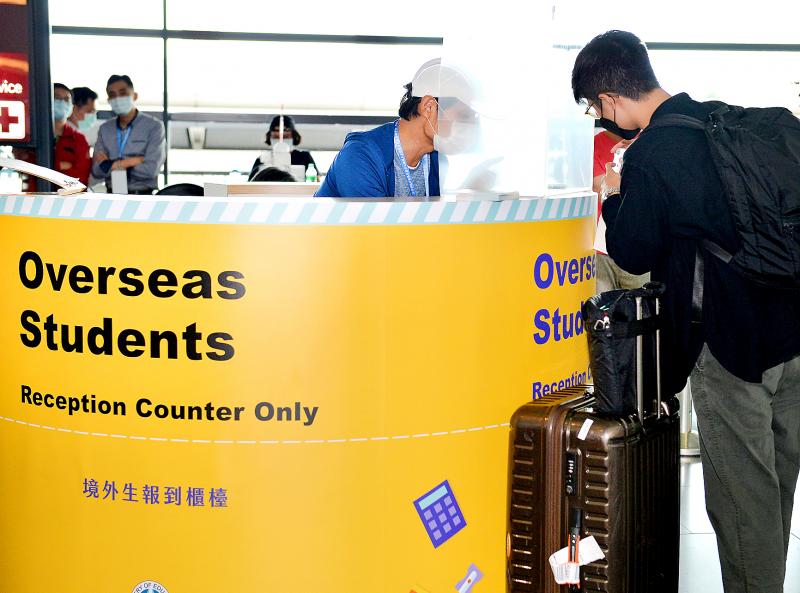More than 100 people who had close contact with a Japanese student who tested positive for COVID-19 on her arrival in Japan from Taiwan are to have their blood tested to see if they have developed antibodies for the virus, the Central Epidemic Command Center (CECC) said yesterday, after all of them tested negative for the virus.
The student arrived in late February to attend classes in southern Taiwan. She tested positive for the virus upon arrival at Narita Airport on Saturday last week.
The case was reported by the center on Wednesday.

Photo: Chu Pei-hsiung, Taipei Times
As the source of her infection is not clear, the CECC has not given the case a number.
The 123 people who had close contact with the woman, including teachers and former roommates, have been ordered to isolate at home.
On Monday, the center is to conduct blood tests on the 123 people to see whether they have been infected, Centers for Disease Control (CDC) Deputy Director-General Chuang Jen-hsiang (莊人祥) told a news conference in Taipei.
A polymerase chain reaction test in Japan showed that the woman’s cycle threshold (CT) reading was between 37 and 38, which is considered “slightly positive” by Taiwan’s standards, Chuang said.
Scientists have yet to arrive at a consensus over what CT value should constitute a confirmed case, he said.
It is possible that the result from the test done in Japan is not reliable, given that people who had close contact with her have all tested negative so far, he said, adding that it was possible that she was infected in Taiwan one or two months ago, or even earlier.
As of yesterday, Taiwan had reported 447 cases, with seven fatalities, CECC data showed.
They comprised 356 imported cases, 55 local cases and 36 among crew members on the navy supply ship Panshih (磐石), the data showed.
In related news, eight foreign students arrived yesterday at Taiwan Taoyuan International Airport and began 14 days of isolation, the Ministry of Education said.
They are among the first batch of 2,238 students allowed to re-enter Taiwan after the center last week announced a list of 11 low-risk countries or regions from which students can return to study in Taiwan, with those planning to graduate this semester prioritized.
The places are Australia, Bhutan, Brunei, Fiji, Hong Kong, Macau, Mongolia, Thailand, New Zealand, Palau and Vietnam.
On Thursday, the airport reopened for transit passengers whose stay is scheduled for less than eight hours. Seven travelers from the Philippines arrived at the airport yesterday on transit stops before flights to three cities in the US.
Additional reporting by CNA

CHAOS: Iranians took to the streets playing celebratory music after reports of Khamenei’s death on Saturday, while mourners also gathered in Tehran yesterday Iranian Supreme Leader Ayatollah Ali Khamenei was killed in a major attack on Iran launched by Israel and the US, throwing the future of the Islamic republic into doubt and raising the risk of regional instability. Iranian state television and the state-run IRNA news agency announced the 86-year-old’s death early yesterday. US President Donald Trump said it gave Iranians their “greatest chance” to “take back” their country. The announcements came after a joint US and Israeli aerial bombardment that targeted Iranian military and governmental sites. Trump said the “heavy and pinpoint bombing” would continue through the week or as long

TRUST: The KMT said it respected the US’ timing and considerations, and hoped it would continue to honor its commitments to helping Taiwan bolster its defenses and deterrence US President Donald Trump is delaying a multibillion-dollar arms sale to Taiwan to ensure his visit to Beijing is successful, a New York Times report said. The weapons sales package has stalled in the US Department of State, the report said, citing US officials it did not identify. The White House has told agencies not to push forward ahead of Trump’s meeting with Chinese President Xi Jinping (習近平), it said. The two last month held a phone call to discuss trade and geopolitical flashpoints ahead of the summit. Xi raised the Taiwan issue and urged the US to handle arms sales to

A magnitude 5.6 earthquake struck off the coast of Yilan County at 12:37pm today, with clear shaking felt across much of northern Taiwan. There were no immediate reports of damage. The epicenter of the quake was 16.9km east-southeast of Yilan County Hall offshore at a depth of 66.8km, Central Weather Administration (CWA) data showed. The maximum intensity registered at a 4 in Yilan County’s Nanao Township (南澳) on Taiwan’s seven-tier scale. Other parts of Yilan, as well as certain areas of Hualien County, Taipei, New Taipei City, Taoyuan, Hsinchu County, Taichung and Miaoli County, recorded intensities of 3. Residents of Yilan County and Taipei received

Taiwan has secured another breakthrough in fruit exports, with jujubes, dragon fruit and lychees approved for shipment to the EU, the Ministry of Agriculture said yesterday. The Animal and Plant Health Inspection Agency on Thursday received formal notification of the approval from the EU, the ministry said, adding that the decision was expected to expand Taiwanese fruit producers’ access to high-end European markets. Taiwan exported 126 tonnes of lychees last year, valued at US$1.48 million, with Japan accounting for 102 tonnes. Other export destinations included New Zealand, Hong Kong, the US and Australia, ministry data showed. Jujube exports totaled 103 tonnes, valued at